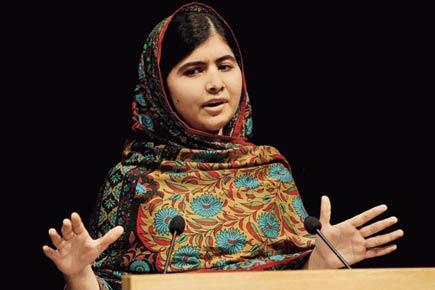17-year-old Nobel laureate Malala Yousufzai said that she spoke to Satyarthi and both of them will try to build strong relations between the two countries

Malala Yousufzai, Malala, Narendra Modi, Indian Prime Minister, Pakistani Prime Minister, Nawaz Sharif, Nobel award ceremony, Nobel Peace Prize
Birmingham: At Birmin-gham Library, the youngest Nobel laureate held the attention of international media as she spoke, being awarded the Nobel Peace Prize, jointly shared with Indian child rights activist Kailash Satyarthi.
ADVERTISEMENT

Malala addresses the media in Birmingham yesterday. Pic/PTI
In her speech, the Pakistani teenager invited Prime Minister Narendra Modi and his Pakistani counterpart, Nawaz Sharif to attend the Nobel award ceremony in Stockholm in December, when she receives the prestigious Nobel Peace Prize along with the Indian activist.
“I request Narendra Modi and Nawaz Sharif to join us when we receive the peace prize. Hope my request would be heard and listened,” said Malala, while addressing the media in London. Malala said she spoke to Satyarthi and the both of them will try to build strong relations between India and Pakistan.
“We have tension on borders between India and Pakistan. We want to fight for peace, development, progress,” she said.Went back to class Malala, who is studying in Edgbaston High School for Girls in Birmingham, was in chemistry class at 10.15 am, studying electrolysis when her teacher entered the class and said she had something important to tell her.
She was called out and informed that she had won the Nobel Prize. However, after hearing the news, she went back to her class and continued her school day, despite her friends congratulating her. The 17-year-old says she is really happy, but the award isn’t going to help her with her GCSEs that depends on her hard work.
She told the media that she wants every child to go to school and get an eduction, and wants to tell every child to stand up for their rights. She added that the award is for ‘all children who are voiceless’ as she stands up with them and speaks up for them. Grateful to family Malala thanked her family, especially her father, for letting her achieve her goal and not conforming to stereotypes about the treatment of women.
 Subscribe today by clicking the link and stay updated with the latest news!" Click here!
Subscribe today by clicking the link and stay updated with the latest news!" Click here!






